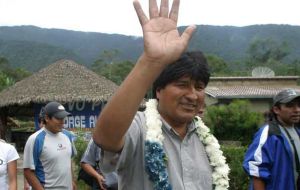MercoPress. South Atlantic News Agency
Bolivia's recall vote confirmed in spite of controversy
 Morales on the campaign trail promises indigenous power
Morales on the campaign trail promises indigenous power A recall vote in Bolivia that could force out President Evo Morales and a group of opposition governors will go ahead on August 10 despite a possible change in voting rules, vice president Alvaro Garcia Linera said on Friday.
In a surprise resolution on Thursday night, the Bolivian National Electoral Court called for a change to voting rules to give the recall process more legitimacy after weeks of protestations of unfairness from the opposition. Morales questioned the court's decision but hinted he would accept it. "As the Executive power we will take that resolution into account, but ... (I don't know) whether a decision taken by the National Electoral Court is more powerful than a law approved by Congress" he told reporters. Morales proposed the recall law last year in an effort to undermine a group of opposition governors in eastern provinces who have challenged his economic and constitutional reforms. His initiative was passed by both chambers of Congress. "There is a law, and these are just suggestions" Vice President Alvaro Garcia Linera told reporters, referring to the court's resolution. Regardless of the voting rules, he said, the recall vote will take place. Morales' opponents had complained that the rules for the recall vote favored the president. Of the country's nine governors, eight face recalls. Under the recall vote law approved by Congress, the president and each governor would be forced out if the votes against them exceeded the percentage and the number of votes each received when elected in late 2005. That meant each governor needed from 52% to 62.1% of the recall vote to prevail. The Electoral Court lowered that to 50% for the governors, but did not modify the rule on the number of votes. The court did not change the rules for Morales, who still needs 46.3% of the vote to stay in office. The power struggle between Morales, the country's first indigenous president, and a group of pro business oriented governors demanding more autonomy for their regions has forced him to put on hold some key reforms, chiefly his plan to redistribute land to poor farmers. Polarization between the relatively prosperous eastern provinces and the western Andes, where Quechua and Aymara Indians strongly support Morales, has repeatedly shaken the country. Morales, an Indian from a poor background has described the recall as a face-off between Bolivians supportive of his drive to tighten the state's grip over the economy, and those who want pro-business politicians back in power. "Two models of government are on the table; the one we defend, which is based on the nationalization of natural resources for the benefit of everyone, and ... the neo-liberal (model)," Morales recently told supporters at a rally. The Argentine government announced earlier this week that Bolivians citizens working in Argentina and wishing to return for the recall vote are entitled to two free days. Employers must pay them the basic rate for the two days and the Bolivians must inform their bosses with a week of anticipation. An estimated two million Bolivians, legal and undocumented, are estimated to live in Argentina.




Top Comments
Disclaimer & comment rulesCommenting for this story is now closed.
If you have a Facebook account, become a fan and comment on our Facebook Page!